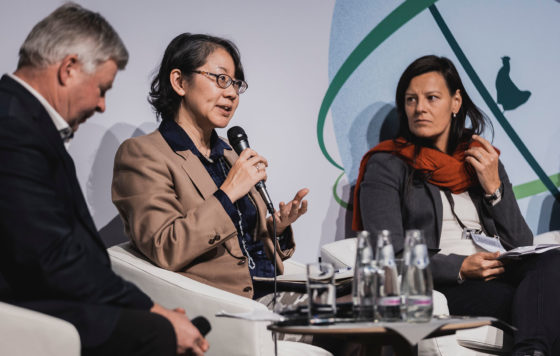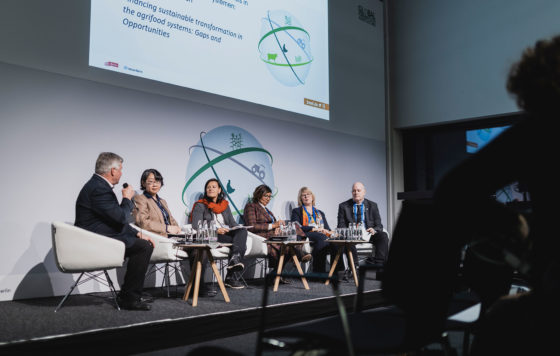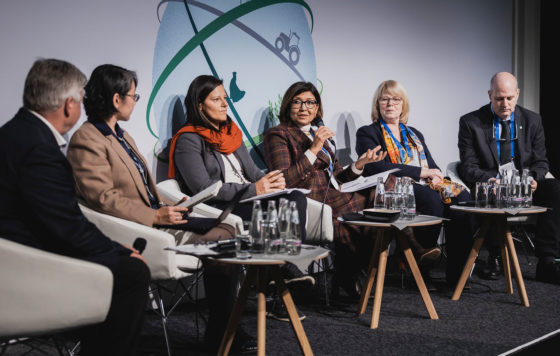Financing sustainable transformation in the agrifood systems: Gaps and Opportunities
Food and Agriculture Organization of the United Nations (FAO)
Time: Thursday, 19. January 2023, 4:00 p.m. – 5:30 p.m.
Room: M2-M3
Languages: English, German, French
Summary:
Agrifood systems across the world offer a unique opportunity to address climate change by building resilience across agrifood systems to ensure their adaptation to climate change, and at the same time reduce greenhouse gases emissions through sustainable agricultural systems. Implementation of climate resilient agrifood systems requires political will, international cooperation, generation and exchange of knowledge and best practices, as well as financial resources to support producers and value chain actors across the world to operate the necessary transformations. The Food and Agriculture for Sustainable Transformation Initiative (FAST), launched at COP27 by the Egyptian COP Presidency, aims at improving the quantity and quality of climate finance contributions to transform agriculture and food systems by 2030. The key message from FAO’s Deputy Director-General Maria Helena Semedo was that a boost in investment is essential to transform the world’s agrifood systems to become more resilient, efficient, sustainable and inclusive, while supporting countries access climate finance and ensuring that appropriate financial resources reach small and medium-scale food producers.
The panel was moderated by Mr Wolfgang Zornbach from the Germany Federal Ministry of Food and Agriculture, and experts included Iride Ceccacci, (EBRD), Martina Fleckenstein (WWF International), and Ritsuko Yoneda, Ministry of Agriculture, Forestry and Fisheries of Japan. They discussed concrete ways in which to promote adaptation to and mitigation of climate change whilst ensuring food security and nutrition, with a focus on FAST’s three pillars, namely: i) access to climate finance, knowledge and capacity, ii) policy supports and iii) dialogue. Iride Ceccaci emphasized the importance of partnerships in realizing the goals of the FAST initiative, and the collaboration of the EBRD with FAO. In this regard, Martina Fleckenstein pointed out that the initiative provides an umbrella and offers several opportunities to address climate change impact.
Keynote Speaker
Honors and awards
November 2019:
• Receives the Crans Montana Forum Prix de la Fondation
December 2018:
• The Government of Brazil bestows the honorific Order of Rio Branco
• The Universidade Aberta in Lisbon confers the Honoris Causa doctorate for her work in global sustainable development
March 2018:
• Named “Woman of the Year” at the commemoration of the 2018 Women Diplomats Day in Portugal
May 2008:
• Receives the Order of Niger for her distinguished service to the field of agriculture
Panel Guests
Nation. Iride previously worked in the Strategy and Policy Unit of the World Bank, Agriculture and Rural Development Department in Washington DC. She started her career at the UN World Food Program about 15 years ago. Iride holds an MA from SAIS Johns Hopkins University in International Economics.
Moderator
1979 – 1986 University of Hamburg – Biology
(Applied Botany, Microbiology, Entomology)
1986 – 1990 PhD in Biology at the University of Hamburg, external work in the Biological Research Center for Agriculture and Forestry (Plant Protection)
1990 – today Ministry of Food and Agriculture
1990 – 2016 – Division Plant Protection / Integrated Pest Management (Officer, Government Director)
Since 2017 – Division Sustainability and Climate Change (Officer, Government Director)
Since 2019
Since 2022 – Head of the Division on Sustainability and
Climate Change
– Head of the Division on Climate Change and Water






